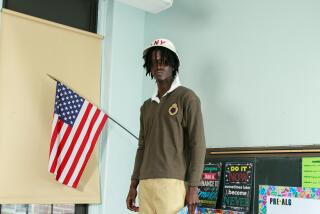New Taiwan Academy in Westwood features films from the island
Taiwanese cinema has had its ups and downs, but in recent years it has been enjoying a renaissance with a new generation of filmmakers. The Taiwan Academy, which opened earlier this month in Westwood and is a branch of the island’s Ministry of Culture, is putting a spotlight on this period with a screening series through November.
Thematically, the nine films in the series range from romantic comedy to gangster fare, and together they form a kind of travelogue, as each film was shot in a different part of Taiwan. The subtitled screenings also feature question-and-answer sessions with guests, all conducted in English, and can accommodate 50 to 60 people.
“Taiwanese culture is very vibrant, and we want to help people understand more about it,” said Benjamin Chi, the director of the academy in Westwood. “Taiwanese filmmakers are very universal, very international. The topics they pick are issues that every country has.”
Among the offerings in the series are 2013’s “A Time in Quchi,” a coming-of-age story about a 10-year-old boy (Oct. 23); “Island Etude,” a 2006 film about a hearing-impaired college student who bikes around Taiwan (Oct. 30); the 2010 gangster film “Monga” (Nov. 6); the 2009 romance “Our Island, Our Dreams” (Nov. 13); “Will You Still Love Me Tomorrow?,” a 2013 romantic comedy about a married man trying to come out of the closet (Nov. 20); and “Cape No. 7,” a 2008 musical dramedy that became Taiwan’s biggest homegrown box-office hit and second only to “Titanic” overall (Nov. 26).
Next on the calendar is “Taipei Exchanges,” which explores the values of idealism and capitalism via two sisters who run a coffee shop. The 2010 film by Hsiao Ya-chuan will be shown at 7 p.m. Friday and will be followed by a talk with Brian Hu, artistic director of the media arts organization Pacific Arts Movement in San Diego.
Taiwan’s cinematic tradition goes back more than 100 years, with a high point being the New Wave and Second New Wave in the 1980s and ‘90s with films from directors Hou Hsiao-hsien, Edward Yang, Tsai Ming-liang and Ang Lee, the last of whom went on to a successful Hollywood career. But tough times befell the industry, as films from overseas curried favor with audiences and production plummeted.
Many feel the slump ended with the success of the 2008 film “Cape No. 7,” which was submitted to the Oscars as Taiwan’s foreign-language entry and is credited with reenergizing the industry. Directed by Wei Te-sheng, “Cape No. 7” centers on a rocker-turned-postman who discovers a stack of undelivered love letters from 60 years earlier.
Opening the academy series were “100 Days” -- a 2013 comedy that was the first Chinese-language film from director Henry Chan, a TV veteran whose credits include “Moesha” and “The King of Queens” -- and the 2012 police action comedy “Black & White Episode 1: The Dawn of Assault.”
In the future, Chi said, the Taiwan Academy hopes to hold screening series on more established directors such as Hou and Tsai. It also is hosting a photography exhibition.
The academy opened in Westwood near the UCLA Hammer Museum on Oct. 2 and is the first physical outpost of the Taiwan Academy program started in 2011 by President Ma Ying-jeou to promote Taiwanese culture. It is open from 9 a.m. to 6 p.m. Tuesdays to Saturdays.
The search for a location took more than a year and a half. After considering places such as Pasadena, Santa Monica and Beverly Hills, officials decided on Westwood because “there is a lot of art and cultural energy in this area, as well as a lot of Taiwanese academics and professionals,” Chi said. Its proximity to UCLA was a plus as well, given that the academy is looking to foster partnerships with the university and others like USC on projects such as the “Spotlight Taiwan” film program.
The Taiwan Academy is not the only organization presenting Chinese-language movies in the area, of course, as UCLA is home to a Confucius Institute that is running its China Onscreen Biennial, Friday through Nov. 10.
Some have drawn parallels between the Taiwan Academy and the Confucius Institute, which is the cultural outreach arm of the People’s Republic of China, as both are meant to emphasize their respective homes’ “soft power” abroad. But Taiwanese officials have emphasized that the two are not meant to compete, with Minister of Culture Lung Ying-tai saying in a 2012 interview that the two are “bananas and apples.”
The Taiwan Academy is at 1137 Westwood Blvd., Los Angeles. The film series is free, but RSVP via email taiwanacademyla@moc.gov.tw or by phone at (213) 403-0168.
Twitter: @swsandell
More to Read
Only good movies
Get the Indie Focus newsletter, Mark Olsen's weekly guide to the world of cinema.
You may occasionally receive promotional content from the Los Angeles Times.











